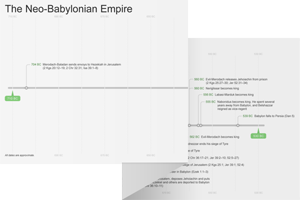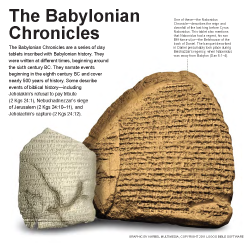5:1–12 Nebuchadnezzar fades from the storyline at the close of ch. 4, and a new king—Belshazzar (not to be confused with “Belteshazzar,” Daniel’s Babylonian name)—comes onto the scene. In the first part of ch. 5, a hand appears and writes a cryptic message on the wall of the banqueting hall after Belshazzar acts irreverently toward Israel’s God. When the Babylonian wise men once again fail to be of use, the queen mother informs Belshazzar of a certain man that previously handled such matters—Daniel. |
5:1 Belshazzar the king The son of King Nabonidus and crown prince of Babylon.
a thousand of Lavish feasts were common among royalty in the ancient Near East (see 1 Kgs 4:22–23; 10:4–5; Esth 1:1–9).
5:2 he tasted the wine Indicates drunkenness. Belshazzar acts ignorantly due to his intoxication.
the vessels of gold and silver See Daniel 1:1–2.
his predecessor Nebuchadnezzar was Belshazzar’s “father” as the founder of their empire and his predecessor as king. It is also possible that his father Nabonidus had married a daughter of Nebuchadnezzar to legitimize his claim to the throne—making Nebuchadnezzar his grandfather. Their reigns are correlated with the beginning and ending of neo-Babylonian history.
may drink from them A disrespectful act. In ancient Near Eastern warfare, placing vessels in the temple of one’s god—as Nebuchadnezzar did—was a sign of defeat over an enemy (see 1:2). But to use them in revelry was sacrilegious; it would demand God’s immediate retribution. This explains Daniel’s indignation in v. 17.
5:3 Then they brought in This type of repetition is done for emphasis and is a common stylistic feature of this genre (see 3:5 and note).
5:4 praised the gods of They desecrate the sacred vessels by using them in idolatrous worship.
5:5 human fingers Details about the detached hand are unknown; it stands as one of the most eerie images in the Bible. It may allude to Exod 8:19; 31:18, and therefore represent the hand of God.
opposite the lampstand Allowing for greater visibility. The hand may have also appeared enlarged due to the lampstand’s shadow.
5:6 his face changed This verse describes the physical responses of the king as terror gripped him.
his thoughts terrified him Similar to Nebuchadnezzar’s initial reaction to his dreams in Dan 2:1.
5:7 the conjurers, the astrologers and the diviners See note on 2:2. At this point, we already expect that the wise men will fail and Daniel will succeed.
will be clothed in purple The royal color. To dress in purple was to imitate royalty.
in purple and will have a necklace of gold hung around his neck A popular gift in the ancient Near East, a gold chain signified authority.
he will rule as third in authority in the kingdom He would rule behind Nabonidus and the crown prince, Belshazzar (see v. 1 and note).
5:8 they were not able Their failure sets the stage for Daniel’s entrance and success.
5:10 the queen The only occurrence of a woman speaking in the book. Her familiarity with the events of a previous king suggests that she is likely the queen mother, possibly a daughter of Nebuchadnezzar (see note on v. 2).
let not your thoughts terrify Reminiscent of Nebuchadnezzar’s statement in 4:19.
the spirit of the holy gods The phrase also could mean “the spirit of the Holy God,” but in the mouth of a polytheist “the spirit of the holy gods” is more likely. See 4:8 and note.
Your predecessor the king The emphasis upon the royalty of Belshazzar’s father (or predecessor; see v. 2 and note) prompts him to act similarly.
appointed him as chief of See 2:48.
5:12 interpreting dreams and explaining riddles and solving riddles The queen extends Daniel’s skills beyond merely dream interpretation; she reestablishes him as a valuable advisor.
Belteshazzar Daniel’s court name is invoked because of its meaning (“Bel protect the prince,” see 1:7 and note). The fact that he was welcomed into the king’s court, renamed, and promoted also reveals Nebuchadnezzar’s high opinion of him. The similarity of the name Belteshazzar with the king’s name—Belshazzar—may also calm the king’s apprehension in recalling this courtier; if they are similarly named, they may be are similar in character. Names in the ancient Near East often functioned as character descriptions.
5:13–31 Daniel enters the narrative after having received an introduction from the queen mother. Unlike the other court tales, Daniel rebukes the king, interprets the writing, pronounces the judgment, and leaves. God’s retribution on the sacrilege of Belshazzar is dealt with swiftly. |
5:13 was brought in Following accepted protocol (see 2:16: 2:24 and note). Not knowing Daniel, Belshazzar may have been less gracious than Nebuchadnezzar in ch. 2 had protocol been broken.
the king spoke Belshazzar repeats the information he just received so that Daniel will know that he is aware of his past success.
one of the exiles Indicates that ethnic tensions still exist (see 3:8 and note).
5:14 I have heard From the queen mother in vv. 10–12.
5:16 if Compare with Nebuchadnezzar’s response in 4:9, 18.
5:17 Let your gifts be for yourself In contrast to his deferential politeness toward Nebuchadnezzar, Daniel rebukes Belshazzar.
5:18 O king Daniel did not add the standard epithet “live forever” (compare v. 10).
God Daniel affirms the superiority of his God over the Babylonian gods (see 3:26 and note).
5:19 the peoples, the nations and languages Representative of the whole empire (see 4:1 and note).
whomever he wanted Indicative of his power, as he did whatever he pleased. The four summary statements in this verse echo the events of the Babylonian deportation and exile.
5:20 his heart became arrogant See 4:30 and note.
5:21 the animals See 4:16, 32.
5:22 have not humbled your heart Like Nebuchadnezzar, pride is the ultimate cause of Belshazzar’s downfall. Unlike Nebuchadnezzar, however, Belshazzar will not be restored (see note on v. 17).
you knew all this Though Belshazzar apparently knew of this incident, he was unaware that Daniel—Nebuchadnezzar’s most trusted advisor—had informed him of his fate. Belshazzar will not follow Nebuchadnezzar’s example of repentance. He consequently receives no opportunity to repent.
5:23 you have exalted yourself against the Lord of heaven The reason for Daniel’s obvious disdain and anger—first displayed in v. 17—is obvious in this verse.
do not see and do not hear and do not know Reminiscent of Isaiah’s critique in Isa 44:18.
5:24 the hand was sent out Perhaps by a watcher (see Dan 4:13 and note) or God Himself (see v. 5 and note).
5:25 Mene, Mene, Tekel and Parsin The enigmatic message is “a mina, a mina, a shekel, and two halves” (either a half-mina or a half-shekel) and refers to units of measure. The related verbal forms (used in vv. 26–28) mean “to number, to weigh, to divide,” respectively.
5:26 the explanation of God has appraised Belshazzar and found him to be an insufficient ruler. As a result, He will strip the kingdom from him and divide it among the Medes and Persians.
5:29 Belshazzar commanded Despite the unfavorable interpretation, Belshazzar promotes Daniel as promised (see v. 16). Though Daniel refused the reward in v. 17, he accepts it here. As a servant of Belshazzar, he likely had no choice. Like Nebuchadnezzar (see 4:27–29), Belshazzar may have been trying to assuage God’s wrath by honoring His prophet.
5:30 That same night God’s retribution is swift.
5:31 Darius The identity of this king is unknown.

|
About Faithlife Study BibleFaithlife Study Bible (FSB) is your guide to the ancient world of the Old and New Testaments, with study notes and articles that draw from a wide range of academic research. FSB helps you learn how to think about interpretation methods and issues so that you can gain a deeper understanding of the text. |
| Copyright |
Copyright 2012 Logos Bible Software. |
| Support Info | fsb |
 Loading…
Loading…
 spent 10 years in Teima and set Belshazzar over the affairs of Babylon while he was gone. Belshazzar served as de facto king until the threat of impending invasion brought Nabonidus back. Until the discovery of additional ancient Babylonian records like The Babylonian Chronicles—which are tablets that record the history of Babylon—the depiction of Belshazzar as the last king of Babylon was sometimes used as an example of Daniel’s historical inaccuracy. The Babylonian texts revealed that Nabonidus had made his son Belshazzar co-regent and ruler of Babylon.
spent 10 years in Teima and set Belshazzar over the affairs of Babylon while he was gone. Belshazzar served as de facto king until the threat of impending invasion brought Nabonidus back. Until the discovery of additional ancient Babylonian records like The Babylonian Chronicles—which are tablets that record the history of Babylon—the depiction of Belshazzar as the last king of Babylon was sometimes used as an example of Daniel’s historical inaccuracy. The Babylonian texts revealed that Nabonidus had made his son Belshazzar co-regent and ruler of Babylon. 

